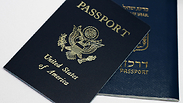A campaign to allow Israelis to enter the United States without a visa is gaining steam in Congress, but is still running into a brick wall with the Obama administration over the a single US government demand: That the Jewish state provide the same treatment at its borders to all Americans, even if they are Arab or Muslim.
Objections from US officials and some lawmakers blocked a congressional effort over the last year that could have allowed Israel to maintain discriminatory entry policies for certain groups of Americans, which no other country can do if its citizens are able to visit the US without visas.
However, a new version of proposed legislation could offer Israel greater flexibility in the Visa Waiver Program, and the administration has pledged to work with Israel to help it move closer to qualifying for the program.
Related stories:
- US intelligence opposes Israeli entry into Visa Waiver program
- In new row, Israel at odds with US over visas
- US: Congress, administration argue over Israeli visas
Israel's push to join the prestigious club of 38 mainly European and Asian nations is a top priority for Prime Minister Benjamin Netanyahu's government, the pro-Israel lobby AIPAC and pro-Israel lawmakers. And because Israel currently meets few of the criteria for membership, the issue has become a sensitive diplomatic and legislative one in Washington, where officials and lawmakers don't want to offend a close friend and ally.
Citizens of member countries can visit the United States for up to 90 days without a visa, provided they register electronically before boarding a flight.
"Reciprocity is the most basic condition of the Visa Waiver Program," State Department spokeswoman Jen Psaki said recently. Asked if the US might soften that demand for Israel, she said: "No. The requirements have not changed. The Department of Homeland Security and the Department of State both remain concerned with reciprocal travel privileges for US citizens due to the unequal treatment that Palestinian Americans and other Arab Americans receive at Israel's borders and checkpoints."
Palestinian-American problem
Up to now, many Palestinian-Americans have been barred from entering Israel. If they are allowed into Palestinian territories, they cannot arrive at Tel Aviv's international airport and must instead travel overland from Jordan or Egypt. Other Americans of Arab origin or Muslim faith say they've suffered similar restrictions, as well as US citizens with political views Israel finds objectionable.Israel has long defended its measures as a security issue and says Americans on a Palestinian population registry aren't necessarily entitled to enter Israel as a condition of the Oslo Peace Accords. The Israeli government applies the rules to "anyone who has parents or grandparents who were born or lived in the West Bank or Gaza," even if they are US citizens and don't claim Palestinian nationality, according to the State Department.
But there are signs Israel may be inching closer to its goal.
The State Department recently told Congress it would work with Israel to help it meet the program's requirement that members approve 97 percent of US visa applications. A bill that gives the president the authority to waive that condition for Israel appears to be gaining momentum. And, a senior Israeli official suggested his government could provide greater travel rights to Palestinian-Americans.
In an interview last month, Ze'ev Elkin, Israel's deputy foreign minister, said his country will now allow Palestinian-Americans to begin entering the country through Tel Aviv's David Ben Gurion Airport. But it's unclear when that might happen. The Israeli Embassy in Washington declined to comment; the Israeli Foreign ministry wouldn't elaborate on Elkin's claims but pledged to cooperate with US officials. "This topic is very important to us," spokeswoman Noga Katz said.
Regardless, US officials are likely to demand more changes from Israel to ensure full reciprocity. These include allowing Palestinian-American tourists permission to enter and exit using their US passports instead of Palestinian identification documents and granting them access to any border crossing available to other Americans.
And, a pledge from Israel to extend reciprocal privileges to all US citizens won't be enough, according to the Department of Homeland Security.

Israel, US passports
Photo: Shutterstock
מומלצים















